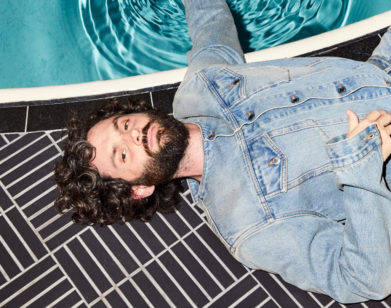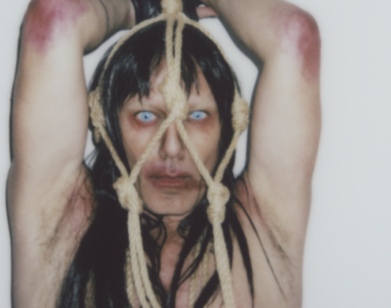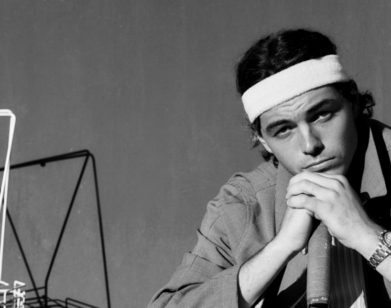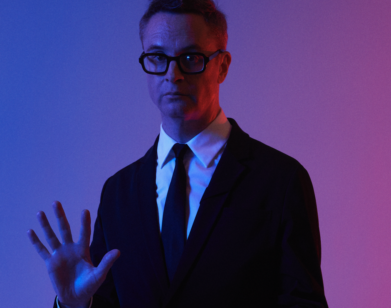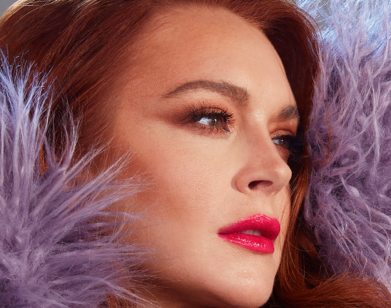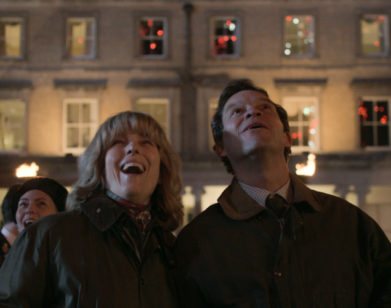In Conversation
Asa Butterfield and Peter Strickland on Guilt, Catharsis, and Secret Orgies
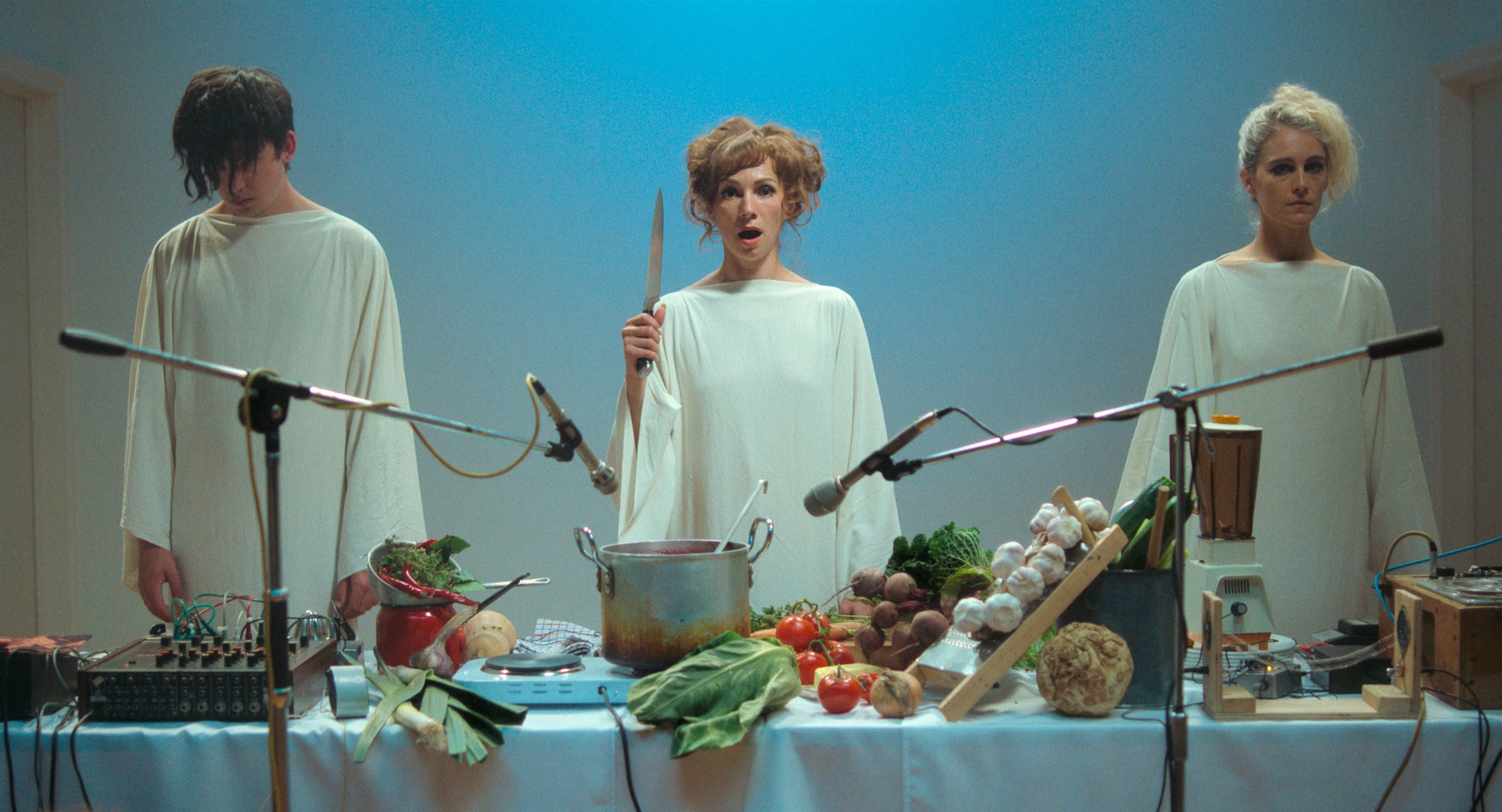
Peter Strickland’s Flux Gourmet explores food as a source of pleasure, pain, and lust. The film follows an unnamed sound-making collective who take up residence at the Sonic Catering Institute, a conservatory devoted to the alimentary arts, where they fight, fuck, and cook. In the weeks leading up to their final performance, the group’s members grapple for dominance–at times literally writhing in puddles of sticky sauce—over each other, and over the institute’s increasingly manic leader, Jan Stevens (Game of Thrones’s Gwendoline Christie). Tasked with documenting the group’s time in residence is Stones (a watery-eyed Makis Papadimitriou), who descends, over the course of the film, deeper and deeper into gastrointestinal distress. Asa Butterfield plays Billy Rubin, an eboy-adjacent musician with greasy bangs and a punk rock sensibility, marking a departure for the 25-year-old British actor from his role as the naive and clean-cut Otis on Netflix’s Sex Education. But for Strickland, Flux Gourmet fits neatly into a decades-long oeuvre of experimental cult films (like 2009’s Katalin Varga and 2014’s The Duke of Burgundy), defined by “sonic psychosis, bondage, retail nightmares and stomach problems.” Following the film’s saucy premiere at the Berlin Film Festival and its recent U.S. release, Strickland sat down with Butterfield for a chat about guilt, catharsis, and secret orgies. —CAITLIN LENT
–––
ASA BUTTERFIELD: Me and Peter first met on a Zoom about a year and a half ago, after I’d read the script. It’s quite hard to get a sense of someone on a webcam, you’re just peering into each others bedrooms. But this script was so specific, and personal, and original. He seemed very excited, which was the important part—you need that in a director.
PETER STRICKLAND: Weirdly, sometimes the more passion there is in the script, the less I have to say about the film in person. I think a lot of people put everything on the page. I’m a bit like a troll—they put all their venom out on the internet but when you meet them in real life, they’re really timid. My writing is a little bit like that. What did you think of the script?
BUTTERFIELD: I really didn’t know what to think of it the first time I read it. I remember calling my agent, and us being on the phone in silence for 10 or 15 seconds. It was so unique, both the story and the way the script was structured. It almost felt more like a play, because it’s all in one location for the most part. It just didn’t read like any scripts I’d read. You just really have to trust that vision.
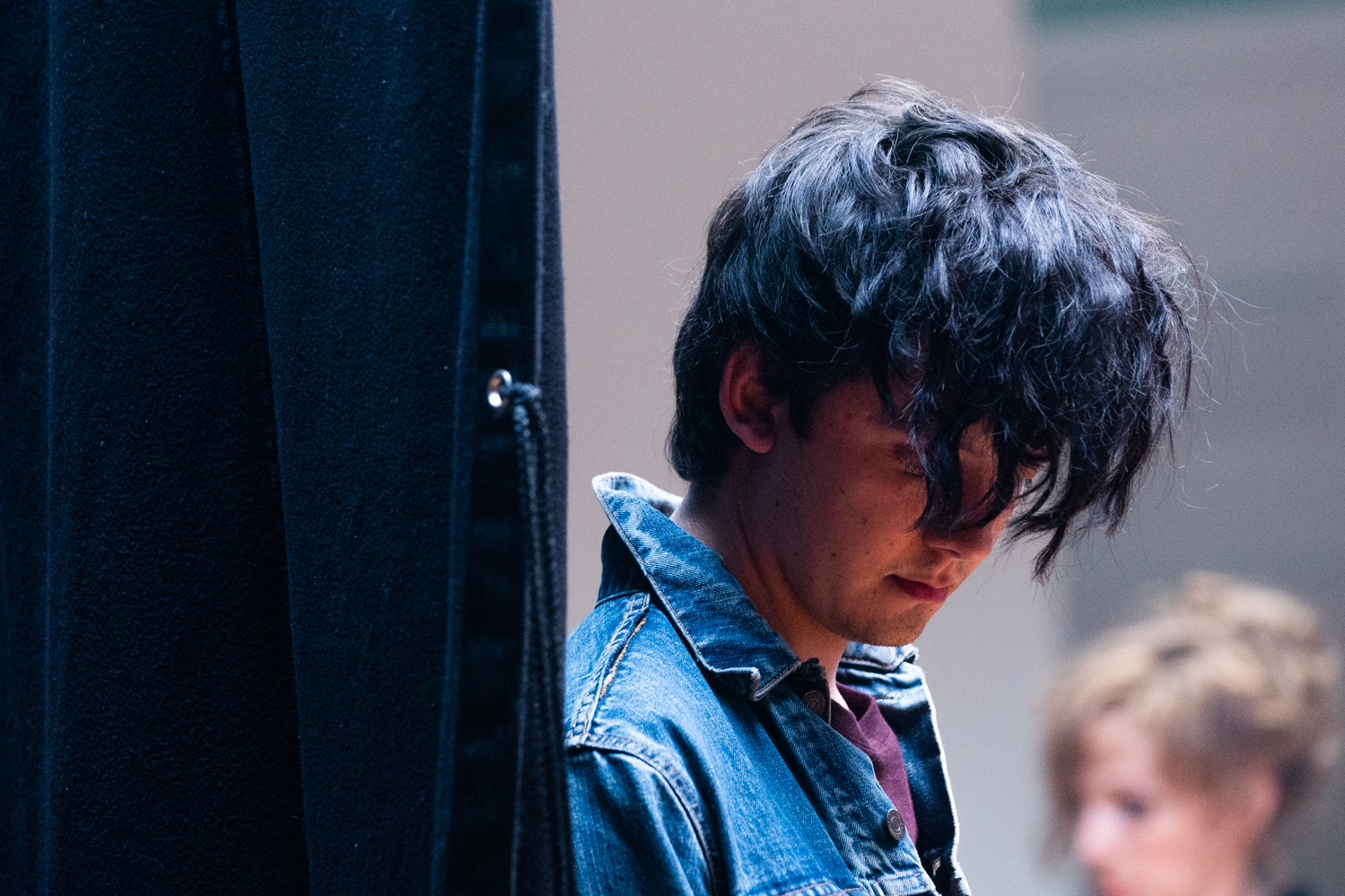
INTERVIEW: How did this project differ from your recent work?
BUTTERFIELD: It’s entirely different. I was at a stage in my work where I just wanted to go in a new direction, play a new character, and challenge myself a bit. This seemed like a good opportunity to do that. I had a clear vision of Billy when I read the script, and then I spoke with Peter about it, and it seemed like we were on the same page.
INTERVIEW: Peter, what it is about the intersection between food and sound that is that you’re so taken by?
STRICKLAND: It’s something I’ve been doing for a long time. In 1996, I had this band called “The Sonic Catering Band.” In the band, we made all these records, which we couldn’t sell. So I thought I better make a film so I can actually make some money. The idea for the film started with a dream I had. I had a dream about mincing up these effervescent vitamin pills, and they made this really heightened sound. I enjoy playing around with these very domestic sounds that most of us in the western world are used to, we kind of kind of cancel them out in our ears, we don’t even notice them. What if you just train your ears to re-listen? But something in the film that I hadn’t really explored before was the idea of autoimmune diseases and allergies. None of that has really been done in film before, and when it is done, it’s through a comedy lens. So, the approach to food in this film is an aggressive, confrontational one—food as a poison, food as an enemy, food as this kind of disruptive force.
INTERVIEW: Can you speak a bit about how you teased that out?
STRICKLAND: The question I focused on is, how do you take a subject—in the film, it’s digestive issues—which is almost universally associated with comedy, to give it some kind of gravity, to give it some kind of solemness? We were trying to take something humorous and dehumorize it. There’s humor in the film, but I wanted to zero in on the idea of social anxiety when you’re hiding bodily functions. To de-stigmatize, you know.
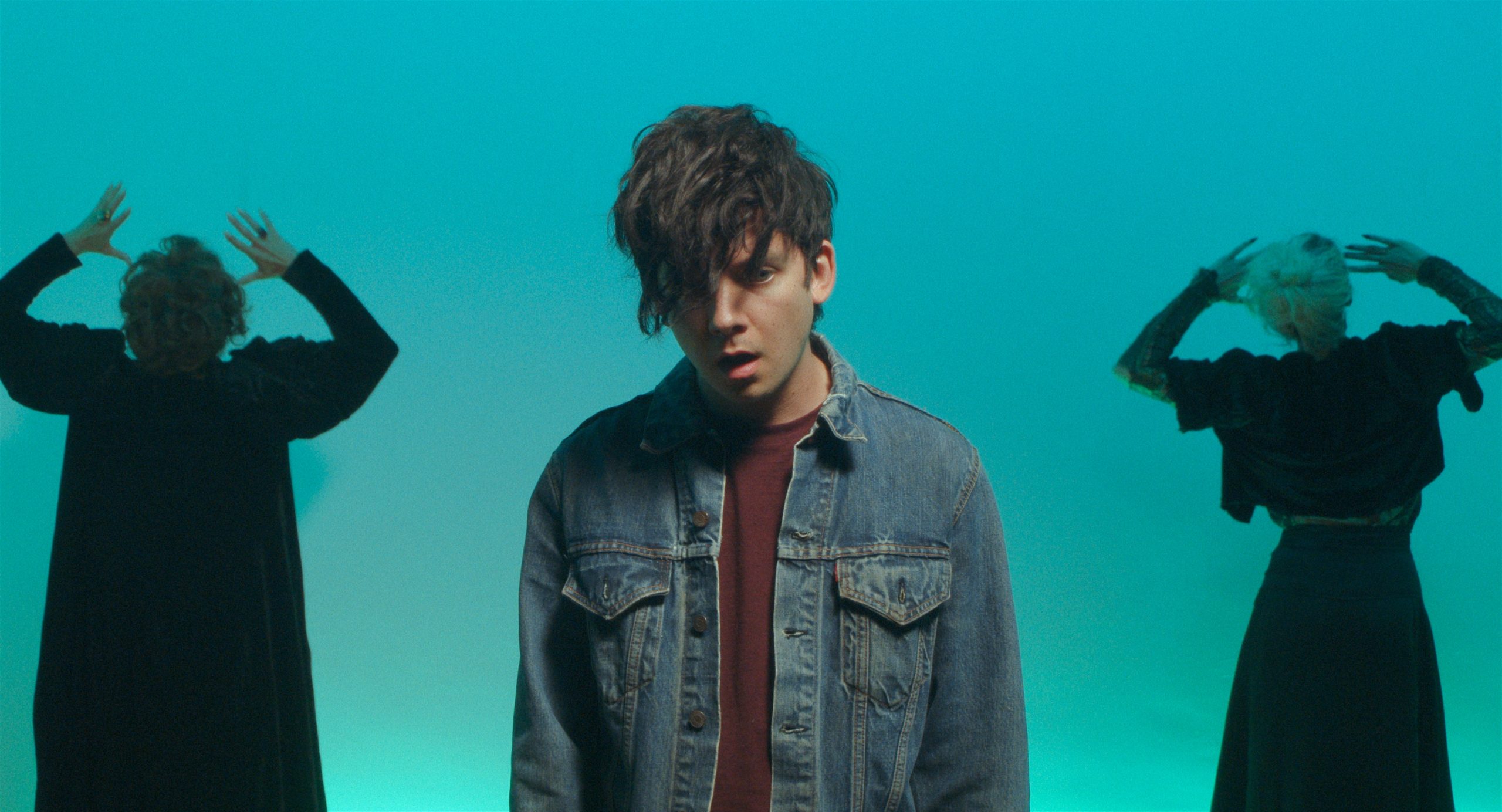
INTERVIEW: Asa, did this film change your relationship to your bowels?
BUTTERFIELD: [Laughs] Eating is central to everyone’s life—we take it for granted. To really reflect on how much taboo there is around that—it’s embarrassing, or just difficult and painful—is eye opening. As Peter said, in film, bodily function is almost always used for a gag. I’ve been guilty of that myself, I’m sure. And no one’s ever really shone a critical light on that. And that was something that I definitely took away from this.
STRICKLAND: I agree with what Asa said about feeling shame. So much of it is just about context. I think that a well-timed fart in a to disrupt a classroom, you know, is a good thing. I would never say you can’t find these things funny. But when someone is clearly suffering, I think that is quite a different thing.
INTERVIEW: What are a few words you would each use to encapsulate the film?
STRICKLAND: For me, catharsis.
BUTTERFIELD: Release.
STRICKLAND: Taboo. That was very important.
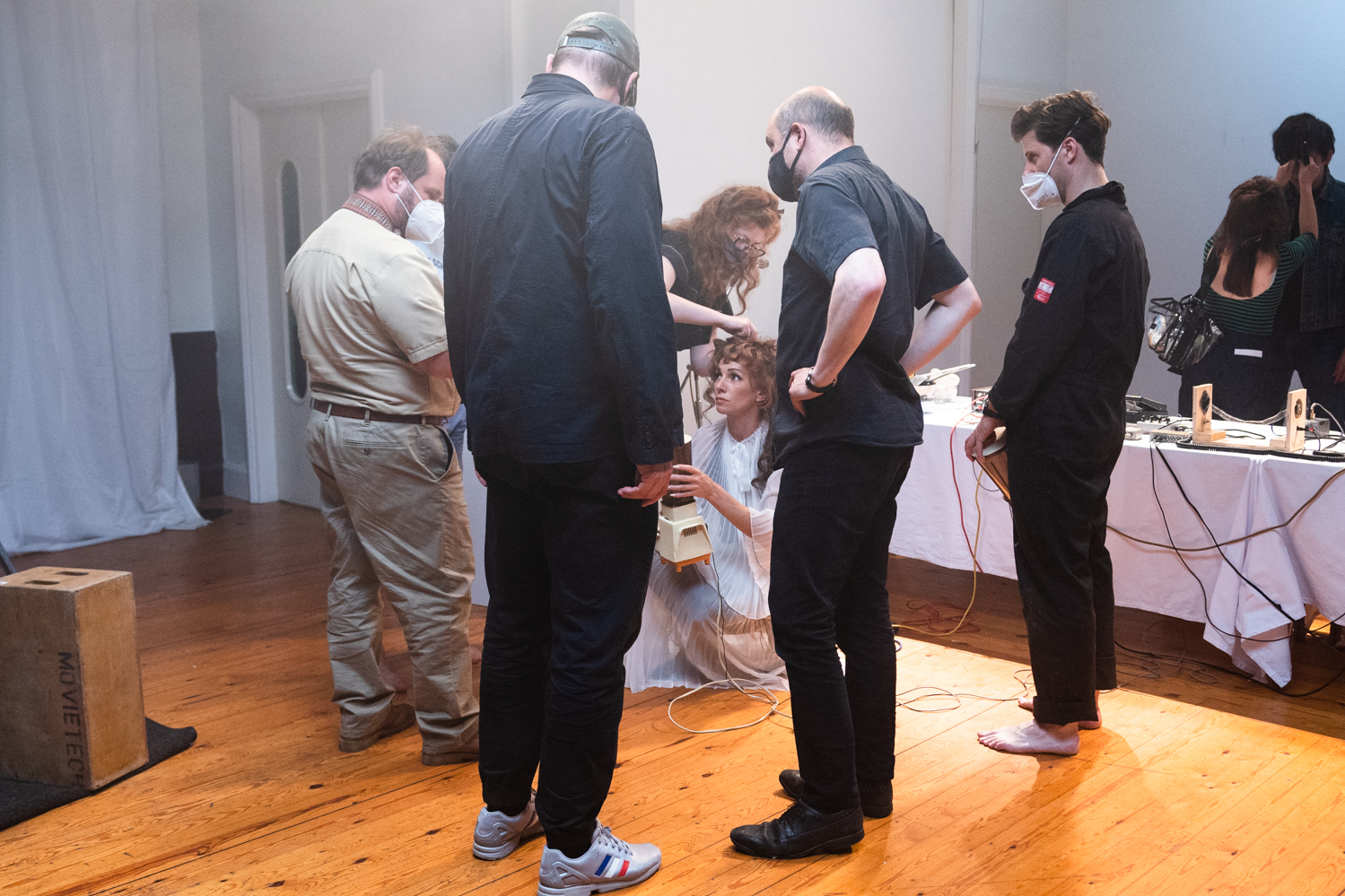
BUTTERFIELD: Power and status.
STRICKLAND: Ego and self-creation.
BUTTERFIELD: And art. There you go.
INTERVIEW: What was the most memorable moment on set for each of you?
PETER: Asa, tell them how you put your foot in it with the owner of the house where we were shooting. When you mentioned the orgies.
ASA: [Both laugh] Oh yeah, I didn’t realize we had code word for the orgy scene—we were supposed to call it the “snooker scene,” so they wouldn’t get uncomfortable or halt production. I blurted out that we were about to do our secret orgy scene to the owner of the house. Either he didn’t hear me, or he didn’t care—either way, he didn’t tell his wife.
PETER: They’ve actually seen the film now, and all was forgiven. We’re allowed to come back.
INTERVIEW: Who is this film for?
STRICKLAND: To me, I find it quite accessible. I think, you know, even if you don’t suffer from digestive issues, I mean, everyone’s been in a situation where they’ve related to that discomfort, although maybe not to the degree we show in the film. And maybe not everyone has been in a band, but I think that idea of bickering and rivalry and power play is relatable. Okay, maybe it’s not for everyone, let me rephrase that. It’s for some people, like Brexit. [Both laugh]
BUTTERFIELD: I think I agree. It’s for anyone who’s willing to go in with an open mind, anyone who is looking for something funny and quirky and thought provoking. Which could be anyone, on the right day.

